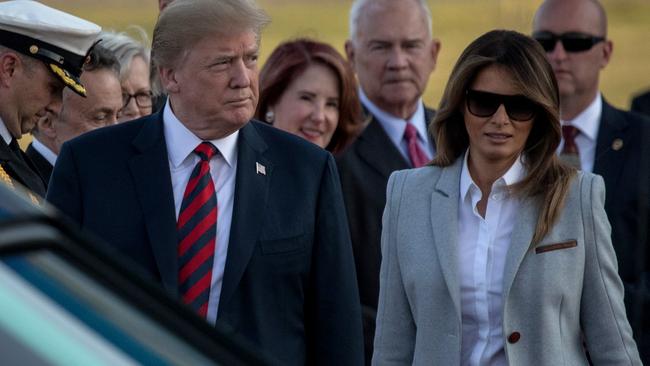Helsinki summit: Fears Donald Trump will let US secrets slip to Vladimir Putin
Without his advisers at his meeting with Vladimir Putin, there are fears Donald Trump may disclose classified information.

The planned 30 to 60-minute meeting in which Donald Trump and President Putin will be alone during their Helsinki summit tomorrow morning (AEST) has raised concerns among America’s closest allies.
Without his secretary of state or national security adviser in the room, there are fears that President Trump could unwittingly disclose information that might compromise western intelligence in an attempt to forge a partnership with the Russian leader.
In May last year, Mr Trump was accused of revealing classified intelligence when he met Sergey Lavrov, Russia’s foreign minister, in the Oval Office. He disclosed that Israeli commandos had carried out a mission in Syria to sabotage an ISIS plot to develop a laptop bomb. The operation had been so secret few of America’s allies knew about it.
Allies such as Israel and Britain rely on the golden rule that shared information is never passed to a third party without the consent of the intelligence provider.
The British government will be hoping that Mr Trump raises the issue of the novichok poisonings. Britain’s conviction that Moscow is to blame is partly based on secret intelligence that may have been shared with the US but has never been released to the public. Mr Trump would be aware of this intelligence but would be expected to make no reference to it in his meeting for fear of compromising British sources and operational methods.
Likewise, the US and NATO have intelligence evidence that Moscow is controlling professional soldiers in eastern Ukraine. Mr Trump has promised to raise Ukraine with Mr Putin, as well as the evidence that Russia interfered with the US presidential election in 2016. But if the Russian president denies any involvement, as he has done in the past, there are concerns that Mr Trump might lay out the secret intelligence he has been given to put pressure on Mr Putin to come clean.
Washington and the NATO alliance are nervous because Mr Trump is at odds with his whole national security team over Russia.
His principal intelligence and foreign policy advisers regard Russia as an adversary and see Mr Putin as a malign leader determined to undermine the western alliance. But Mr Trump views Mr Putin as a potential partner and friend.
As a KGB-trained interrogator and operator, Mr Putin will be looking out for any intelligence indiscretions and also be waiting for any chance to exploit signs of warmth to persuade Mr Trump to offer concessions, such as the lifting of sanctions.
The Times



